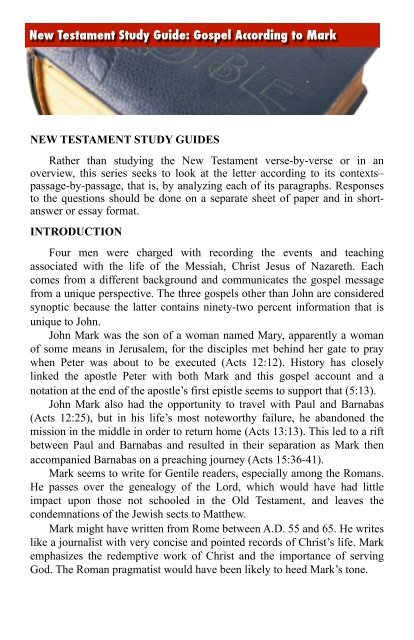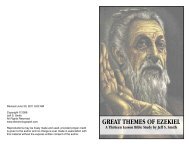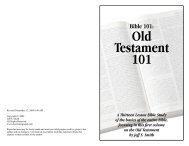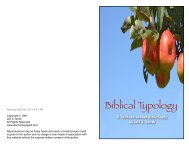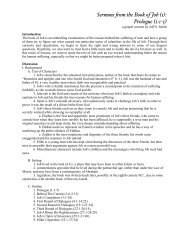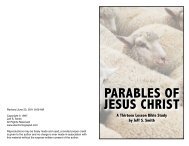New Testament Study Guides - ElectronicGospel
New Testament Study Guides - ElectronicGospel
New Testament Study Guides - ElectronicGospel
Create successful ePaper yourself
Turn your PDF publications into a flip-book with our unique Google optimized e-Paper software.
<strong>New</strong> <strong>Testament</strong> <strong>Study</strong> Guide: Gospel According to Mark<br />
NEW TESTAMENT STUDY GUIDES<br />
Rather than studying the <strong>New</strong> <strong>Testament</strong> verse-by-verse or in an<br />
overview, this series seeks to look at the letter according to its contexts–<br />
passage-by-passage, that is, by analyzing each of its paragraphs. Responses<br />
to the questions should be done on a separate sheet of paper and in shortanswer<br />
or essay format.<br />
INTRODUCTION<br />
Four men were charged with recording the events and teaching<br />
associated with the life of the Messiah, Christ Jesus of Nazareth. Each<br />
comes from a different background and communicates the gospel message<br />
from a unique perspective. The three gospels other than John are considered<br />
synoptic because the latter contains ninety-two percent information that is<br />
unique to John.<br />
John Mark was the son of a woman named Mary, apparently a woman<br />
of some means in Jerusalem, for the disciples met behind her gate to pray<br />
when Peter was about to be executed (Acts 12:12). History has closely<br />
linked the apostle Peter with both Mark and this gospel account and a<br />
notation at the end of the apostle’s first epistle seems to support that (5:13).<br />
John Mark also had the opportunity to travel with Paul and Barnabas<br />
(Acts 12:25), but in his life’s most noteworthy failure, he abandoned the<br />
mission in the middle in order to return home (Acts 13:13). This led to a rift<br />
between Paul and Barnabas and resulted in their separation as Mark then<br />
accompanied Barnabas on a preaching journey (Acts 15:36-41).<br />
Mark seems to write for Gentile readers, especially among the Romans.<br />
He passes over the genealogy of the Lord, which would have had little<br />
impact upon those not schooled in the Old <strong>Testament</strong>, and leaves the<br />
condemnations of the Jewish sects to Matthew.<br />
Mark might have written from Rome between A.D. 55 and 65. He writes<br />
like a journalist with very concise and pointed records of Christ’s life. Mark<br />
emphasizes the redemptive work of Christ and the importance of serving<br />
God. The Roman pragmatist would have been likely to heed Mark’s tone.


